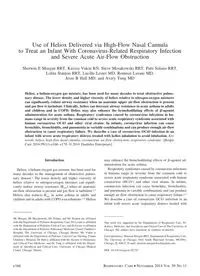
2014 Use of Heliox Delivered via High-Flow Nasal Cannula to Treat an Infant With Coronavirus-Related Respiratory Infecti PDF
Preview 2014 Use of Heliox Delivered via High-Flow Nasal Cannula to Treat an Infant With Coronavirus-Related Respiratory Infecti
Use of Heliox Delivered via High-Flow Nasal Cannula to Treat an Infant With Coronavirus-Related Respiratory Infection and Severe Acute Air-Flow Obstruction Sherwin E Morgan RRT, Kirissa Vukin RN, Steve Mosakowski RRT, Patti Solano RRT, Lolita Stanton RRT, Lucille Lester MD, Romeen Lavani MD, Jesse B Hall MD, and Avery Tung MD Heliox, a helium-oxygen gas mixture, has been used for many decades to treat obstructive pulmo- nary disease. The lower density and higher viscosity of heliox relative to nitrogen-oxygen mixtures can significantly reduce airway resistance when an anatomic upper air-flow obstruction is present and gas flow is turbulent. Clinically, heliox can decrease airway resistance in acute asthma in adults and children and in COPD. Heliox may also enhance the bronchodilating effects of �-agonist administration for acute asthma. Respiratory syndromes caused by coronavirus infections in hu- mans range in severity from the common cold to severe acute respiratory syndrome associated with human coronavirus OC43 and other viral strains. In infants, coronavirus infection can cause bronchitis, bronchiolitis, and pneumonia in variable combinations and can produce enough air-flow obstruction to cause respiratory failure. We describe a case of coronavirus OC43 infection in an infant with severe acute respiratory distress treated with heliox inhalation to avoid intubation. Key words: heliox; high-flow nasal cannula; coronavirus; air-flow obstruction; respiratory syndrome. [Respir Care 2014;59(11):e166–e170. © 2014 Daedalus Enterprises] Introduction Heliox, a helium-oxygen gas mixture, has been used for many decades in the management of obstructive pulmo- nary disease.1 The lower density and higher viscosity of heliox relative to nitrogen-oxygen mixtures can signifi- cantly reduce airway resistance (Raw) when an anatomic air-flow obstruction is present and gas flow is turbulent.2,3 Heliox also reduces Raw in acute asthma in adults and children and in adults with COPD exacerbations.3-5 Heliox may enhance the bronchodilating effects of �-agonist ad- ministration for acute asthma. Respiratory syndromes caused by coronavirus infections in humans range in severity from the common cold to severe acute respiratory syndrome associated with human coronavirus (HCoV) and other viral strains. In infants, coronavirus infection can cause bronchitis, bronchiolitis, and pneumonia in variable combinations and can produce enough air-flow obstruction to cause respiratory failure.6,7 We describe a case of coronavirus OC43 infection in an infant with severe acute respiratory distress treated with Mr Morgan, Mr Mosakowski, Ms Solano, and Ms Stanton are affiliated with the Department of Pediatric Respiratory Care; Dr Lavani is affiliated with the Department of Pediatric Critical Care; and Dr Lester is affiliated with the Department of Pediatric Pulmonary Medicine, Comer Children’s Hospital, The University of Chicago, Chicago, Illinois. Ms Vukin is affiliated with the Department of Pediatric Critical Care Nursing, Comer Children’s Hospital, Dr Hall is affiliated with the Section of Pulmonary and Critical Care Medicine, and Dr Tung is affiliated with the Depart- ment of Anesthesia and Critical Care, University of Chicago Medical Center, Chicago, Illinois. This work was supported by the Departments of Respiratory Care, Pe- diatrics, Medicine, and Anesthesia and Critical Care of The University of Chicago. The authors have disclosed no conflicts of interest. Correspondence: Sherwin Morgan RRT, Department of Respiratory Care, The University of Chicago, 5841 South Maryland Avenue, MC0981, Chicago, IL 60637. E-mail:
